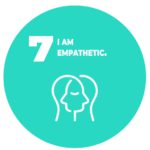Home > About > The Principles > I am empathetic

Dignified storytelling prioritises thoughtful reflection on the short and longer-term implications behind each story choice.
Dignified Storytelling is mindful of the implications the stories might have on individuals, the wider community, and the environment. This is why reflection should underpin both story planning and development, with an openness to adjusting plans, processes, and narratives to help ensure positive impact.
Dignified storytelling encourages storytellers to employ “empathy checks” throughout the storytelling process, especially prior to publication, considering whether they would be comfortable sharing the visual or written story if it were a depiction of themselves or someone close to them. Imagining themselves in the position of the contributor can help storytellers consider the potential impact of the story from a deeper, more personal perspective and to make choices accordingly.
Beyond individual storytellers, there is a wider organisational responsibility to help ensure a positive impact for all. Organisational culture can promote the idea that speaking up for dignified storytelling is the responsibility of all staff members.

Organisational policies and procedures should also stipulate checkpoints for the potential impact of stories on contributors and their families. Editorial boards with diverse representation can help ensure that multiple perspectives are taken into account when considering the potential impact of a story.
Guidelines to put this principle into practice
Dignified storytelling considers the impact on individuals, communities, and the natural environment.
TO HELP PUT PRINCIPLE #7 INTO PRACTICE, CONSIDER THE FOLLOWING:
Reflect on the questions below (while planning, gathering, processing, and publishing a story), taking steps to address any gaps or concerns that arise during the reflection.
1. Who is speaking?
2. For whom?
3. About what?
4. For what purpose?
5. What is missing?
Paraphrased from: Solomé Lemma, Thousand Currents, as highlighted in Changing the narrative: Weaving #ShiftThePower throughout the #Globaldev sector, hosted by Jennifer Lentfer and sponsored by the Global Fund for Community Foundations.
Check in with contributors after the story is published, asking “how did you feel about seeing the story?” or “how did you feel about your story being seen by others?” Use these responses and feedback to guide future actions.
Tackle potentially sensitive content through creative techniques such as using illustrations rather than photographs, different modes of storytelling (for example, podcast rather than video), or ways of framing the image.
Be mindful of publication timing and consider delaying the story if the climate is not favourable or likely to be receptive; for example, if a current event or the political atmosphere warrants at least temporarily holding the story to a time when it is likely be better received, with positive impact for the contributors.
Find platforms and avenues to use stories and storytelling as a tool to bring about positive change – in the lives of the contributors, communities, other stakeholders, and audiences.
Top Tips for Principle No. 7
Empathy Checks
Employ “empathy checks” throughout the storytelling process, especially prior to publication, considering whether you would be comfortable sharing the visual or written story if it were a depiction of yourself or someone close to you.
Stories as a force for good
Find platforms and avenues to facilitate the use of stories and storytelling as a tool to bring about positive impact.
More in the Handbook
The Dignified Storytelling Handbook is a resource to help storytellers and organizations promote and
employ storytelling practices that are grounded in a deep respect for human dignity
Available for download in English, Arabic, Spanish and French
